|
|
|
thirsty mockingbirds
Wednesday, January 26 2005
setting: Española Island, Galapagos, Ecuador
During the night our boat spent six hours driving to the remote island of Española (also known as Hood), the most southeastern (and geologically oldest) of the Galapagos. For some reason this voyage didn't cause me nearly as bad of a stomach upset as the relatively short trip to Santa Fe. Perhaps I had developed my sea legs, so to speak. For her part, though, Gretchen had terrible night's sleep, mostly because of the relentless drone of the engines.
After breakfast, pangas delivered us to a dry landing on a pile of volcanic rocks on the Española shoreline. Immediately we were greeted by dozens of idle sea lions, some of which were frisky and playful and others of which would have passed for dead had they not been visibly breathing.
In amongst the sea lions were the inevitable Sally Lightfood Crabs and a variety of especially large and colorful marine iguana. Supposedly the color of these particular iguanas comes from special pigments in the seaweed found only near this island.
Nearly as flamboyant as the sea lions and marine iguanas were the mockingbirds, descendents of unfortunate storm-tossed individuals from the continent. These birds were so tame that it took little convincing to get them to land on your hand, particularly if you had a water bottle in your possession. The limiting luxury in their life seemed to be fresh water, and the moment any was presented, several would appear, form a circle around it, and drain it completely away with their long beaks. I gave them water on several occasions until I was chided in broken English by a Chinese tourist dressed in attire suitable for a night out on the town in Quito back in the late 1970s. The rules of the Galapagos is that you're not suppose to offer the wildlife anything at all, including something as benign as water, something that was never really explained by the guide. It makes sense not to encourage the mockingbirds with water, since they've long ago come to associate hikers with fresh water, something that makes their behavior less natural. Still, fresh water was such an easy thing to dispense and so greatly appreciated by the birds that it had seemed like a completely harmless act. When the birds had drunk their fill, they'd hop off across the lava boulders without any obvious sense of direction. Once they'd had fresh water, there was nothing else in the universe that they could imagine wanting. Later I learned that large fractions of the mockingbirds on the dry Galapagos die during the droughts. (They normally depend on morning dew for their fresh water needs on freshwater-free islands like Española.)
Our hike took us from the sea lions to the top of some cliffs overlooking several blowholes that would erupt like weak geyers whenever a wave would slam into them. At our feet along the cliff's edge were occasional Masked Booby nests, some with fat fluffy chicks. When sleeping, these loose-jointed chicks could assume any posture imaginable and look for all the world to be dead.
At the furthest point in our hike we came to a part of the cliffs where individual Waved Albatrosses prefer to launch themselves into the air. Normally the last of the albatrosses have left the Galapagos by early December, but for some reason there was one there today and we got to see him leap off the cliffs and soar quickly away on the wind.
Later we all went snorkling around a small island. I was able to handle the first ten percent of the island's circumference, but then the waves started to overwhelm me and I was forced to ride in the panga while the others continued with their fun. I felt like a handicapped kid missing out on something very exciting.
After lunch and an afternoon siesta, our boat landed at another Española beach further to the west. The sand of the beach was comprised entirely of tiny bits of white corral. As with most beaches in the Galapagos, it was thick with sea lions who had hauled themselves out of the ocean to sun. Gretchen and I went with our guide for a walk down the beach while the other swam or attempted to snorkle, though the latter was more or less impossible in the sediment-rich waves. At some point the Swedish women in our contingent began making a sand castle. Inspired, I began making a sea lion out of sand. As a model, I used a lethargic sea lion a couple meters away. Gretchen was stretched out next to it hoping for accidental contact like a transparently-persistent suitor.
Unexpectedly, as I was putting the finishing touches on my sculpture, the model leapt up from her slumber and then threw herself down against my creation. She must have known it was fake, but there was still something about its form that made her want to snuggle and spoon with it. As for us human onlookers, all we could do was snap our cameras in disbelief. During a lull in the picture taking, I managed to get close enough to repair parts of the sand sea lion that its inspiration had inadvertently destroyed.
Back on the Golondrina I found myself lounging on the topmost deck while various people congregated and socialized on the only accessway to where I was. They were all drinking from the exorbitantly-priced Golondrina bar and begging one another to sing songs from their respective homelands. Not feeling anywhere near as jovial as the others, I felt trapped where I was. If I got up and walked past these merry-makers, I knew that I'd be called upon to sing. But I couldn't imagine faking a sufficiently polite face for whatever response might be required, so I stayed where I was and waited for the dinner bell to break up the merriment. It seemed to take forever.
Over dinner Gretchen and I had most uncomfortable discussion with the one German guy on the boat, let's call him Egon. The discomfort started as it often does when talking to Germans. Egon was talking about the Jews. Apparently "the Jews" (that's the term he used) are presiding over some sort of big new Holocaust memorial in Germany and "Anything they want they get. All they have to do is snap their fingers and Germans jump." To me it seemed like a rather minor inconvenience compared to the big one the Germans had visited upon the Jews not so very long ago, but Egon made it sound like a serious injustice. He reminded us, as all young Germans are quick to do, that he wasn't alive during the Holocaust, so why should he be made to suffer for the sins of his fatherland?
Later in the conversation Egon felt the need to disagree with something Gretchen had said earlier about how gays and lesbians should have the right to marry and raise children. Egon said that, in his opinion, two men or two women cannot form a family, because a family requires a male father and a female mother. The logical basis for this argument was unusually weak: that he'd had a happy childhood and his parents were heterosexual. Following the same logic, he'd make no less sense in claiming that only Germans be allowed to have children. We explored his beliefs by asking if two loving lesbians make for a better family than a family that includes an abusive father. Egon was sure that an abusive father was always superior to the complete absence of one. It wasn't the kind of dogma that one can easily argue against.
Later, down in our cabin, Gretchen and I dissected this conversation using tiny rhetorical implements. Concerning the common German lament, "I wasn't around for the Holocaust, so why should I have to pay?" I observed that I wasn't around during the Trail of Tears, but nevertheless my nation, the same one that provided for me, should make good on this serious historical error. My view was that if 20% of America were taken up by memorials to dead Indians, it wouldn't be too steep a price to pay for having stolen nearly 100% of their land. Similarly, I thought, the Germans of today should gladly accept the Holocaust memorials as part of the price of living in a Germany that hopes to be respected by the world.
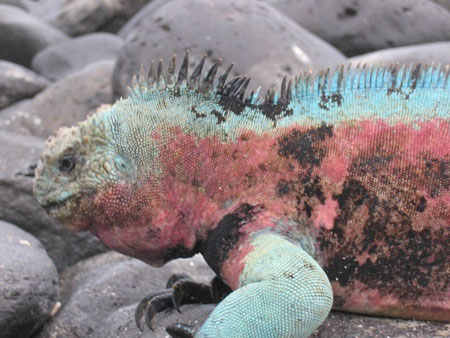
A colorful Española marine iguana.
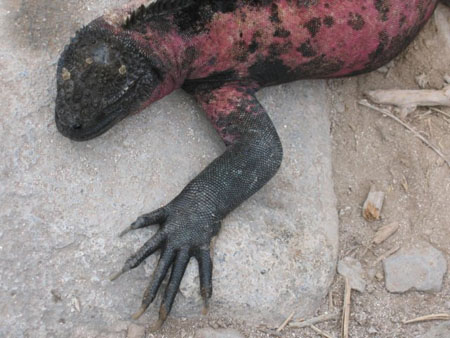
A marine iguana displays its human-like hand (the human hand retains the primitive shape of the basic vertebrate paw).
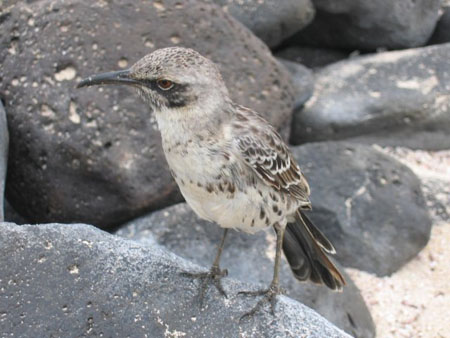
A Hood Mockingbird.
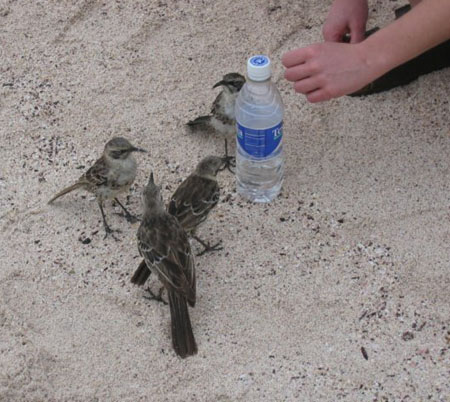
Hood Mockingbirds begging for water.
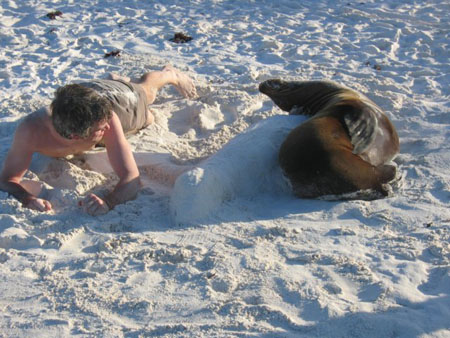
A sea lion examines me past a sand sculpture I made of her.
For linking purposes this article's URL is:
http://asecular.com/blog.php?050126 feedback
previous | next |




